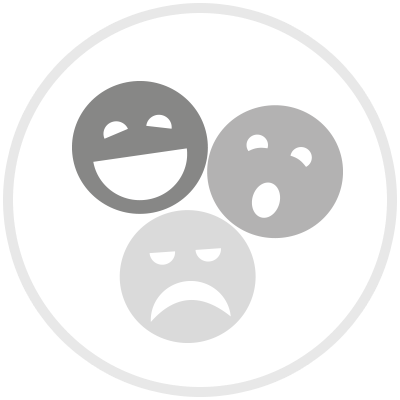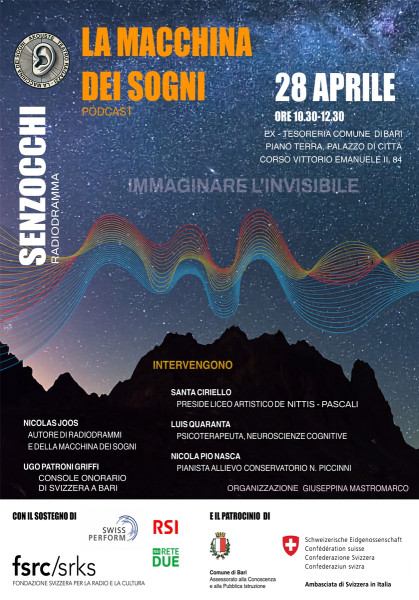IMMAGINARE L'INVISIBILE
 Cultural
Cultural

**Imagine the Invisible** is an event supported by the Swiss Foundation for Radio and Culture, Swissperform, RSI (Swiss Radio and Television), Radio Rete Due, and sponsored by the City of Bari, the Department of Knowledge and Public Education, and the Embassy of Switzerland in Italy.
**Event Program**
The audience present in the room, including some classes from the De Nittis-Pascali High School in Bari, is offered a listening of an excerpt from the radio drama *Senzocchi* and some podcasts from *The Dream Machine* (each podcast lasting 4 minutes).
**Themes of the Event Imagine the Invisible**
**THE DREAM MACHINE (3m x 3m mobile recording studio)**
In a world where everything is image, everything is visible, what space is there for imagination, for feelings, for the invisible? Every 10 minutes, a group of 2 to 10 participants enters the Dream Machine. Elements in a chest (watches, mirrors, sounds, colors, cards, fragrances) suggest a story for the participants to invent. Once the story (the dream) is created, the participants interpret (live) it as characters at the microphones. The story is recorded and soundtracked with the sound environments they imagined (recreated on the computer). The podcasts are sent via the internet at the end of the experience to the participants (for schools they are sent to the teachers).
**FROM PERCEPTION TO IMAGINATION**
The senses perceive stimuli from the surrounding environment. Every perceived stimulus is memorized. To every perception of the external (environment) or internal world (our body), we react with emotions that in turn generate feelings. Imagination can reactivate the memorized perceptions even without the presence of the stimuli themselves. On an acoustic level, we can imagine the sound of lightning, a train whistle, a voice, a melody. On a visual level, a sunset or a ship. Our memory retains infinite perceptions, acquired through experience or already present in us genetically during evolutionary processes (only waiting to be reactivated, like the fear of snakes). Imagination is the fire of art and all the technical and scientific inventions that have allowed us to survive. (Two porters carrying a cumbersome piece of furniture up the stairs use a lot of imagination). Imagination can find solutions, shed light, where reason and logic no longer see. To imagine we estrange ourselves from reality, often closing our eyes to do so.
Dreams are desires. Participants entering the Dream Machine find the emotions to realize their dreams. Feelings are closely linked to imagination. Without imagination, there's indifference.
**FROM THE DREAM MACHINE TO SENZOCCHI**
I've been selling dreams at markets, country festivals, processions, and festivals, but also in elementary schools and high schools for almost three years. I sell dreams in all languages, to tourists, the elderly, and children. I have created a kind of mobile confessional, or rather a Dream Machine, where those who enter, close their eyes, imagine a story, and then tell it. But the story has to be imagined well, and while telling it, they must also get emotional, because that's the only way dreams come true, by believing in them. If the storyteller does it the right way, following my advice, then I record their voice, add some sound effects, and turn the dream into a Podcast. I've listened to thousands of dreams, and the most beautiful ones are those told with closed eyes. Sight hinders imagination. And what if we never had eyes? How would our imagination have evolved? I started writing a story about a Senzocchi people living under the Swiss Alps (I'm Swiss) in a giant dark cave. And what if the eye was a parasite from space implanted in the nervous system of creatures? When we close our eyes and imagine, we enter the invisible, the magical dimension of the dream, without time or space, the same dimension enveloping our lives like the universe does with stars.
**SENZOCCHI**
Radio drama recorded at the end of 2024 in RSI (Swiss Radio Television) Studio 4. Music by Gabriele Giannetti and Valeria Sturba. Radio original by Nicolas Joos. Loosely based on *The Country of the Blind* by H. G. Wells (1904). Cast includes Margherita Coldesina, Matteo Carassini, Dario Sansalone, Luca Maciacchini, Mirko D'Urso, Nicolas Joos, Diego Pitruzzella, Roberto Regazzoni. Sound recording, editing, and mixing by Yuri Ruspini. Production by Francesca Giorzi.
Switzerland 1930. Fascism and Nazism force the small neutral country into compromises. Europe, after the American economic crisis of 1929, is on its knees and runs to rearm. Russia, outside the Western economy, causes famines in Ukraine. Under the Swiss mountains, in the Underworld, in a giant dark cave full of gold and giant cows, lives the imaginary people of the Senzocchi, a people without eyes who don't know power (they don't value gold because they can't see it). In the Underworld, inhabitants have proximity senses (touch, hearing, taste, smell), use a lot of imagination, living free and in peace. In the Upper World (historical reality), the sense of sight (of distance) dominates, extreme right-wing parties spread, indifference and terror have rendered the people unable to imagine or react.
**A FEW WORDS ABOUT THE RADIO DRAMA**
Radio drama has always been criticized for narrating and representing reality solely through noises, voices, and sounds, without being able to show it. It is referred to as a theater for the blind, treating the sensory limitation as an amputation, as if radio drama were a mutilated theater. But the supposed amputation is instead its very quality. With cinema, television, social media, and now artificial intelligence, we lack nothing, and imagination can go dormant. The necessity to create what is missing activates the imagination. Making the invisible visible. The theater for the blind begins with nocturnal settings. What is wanted to be emphasized is the dimension of blindness to create empathy between the listener (who does not see what is happening) and the protagonist of the story. Night evokes the dream dimension. Hearing the invisible. One of the first radio dramas in history is *Danger* by R. Hughes (BBC 1924) set inside a mine, in the dark. Radio drama explores inner spaces, giving voice to consciousness. This does not mean that a radio drama cannot be entertaining. Radio drama must know how to evoke, must activate imagination. Realistic noises, like a door closing or footsteps in a room, are good for a film, not a radio drama. If we offer imagination a defined, easily identifiable noise, it does not activate.
Today we listen to the radio via the internet. All audio programs broadcast over the internet are Podcasts. In 1924, people listened to radio dramas in the evening, in 1950, they watched television, in 1990 computers, in 2004 cell phones. 100 years have passed since the first radio drama, and we still listen to them. The 2020 pandemic turned us all into Podcasters. We needed to activate our imagination because we couldn't see each other; we were all a bit amputated. When we were small, before sleeping, mom and dad told us stories, tucked us in, turned off the light, and in the dark, we saw the invisible. This is the essence of radio drama.
**Participants:**
- Nicolas Joos: Theater actor, radio drama author
Author of the *Senzocchi* radio drama and creator of the Dream Machine
- Prof. Ugo Patroni Griffi: Honorary Consul of Switzerland in Bari
Cultural promotion of the Swiss consulate in Bari
- Prof.ssa Santa Ciriello: Headteacher of the De Nittis-Pascali Artistic High School
Imagination and emotions for learning and education
- Luis Quaranta: Psychotherapist
Luis Quaranta will provide a theoretical framework regarding the mechanisms underlying imagination, dream, and emotions, and will guide participants through bodily and imaginative techniques, facilitating contact with their emotions and with the symbols that inhabit the unconscious, like the archetypes contained in the Major Arcana of the Tarot. He says: "We have lost contact with our body, in a social system that always pushes us to perform and stay in our heads, so the key access to returning to our true essence starts from the body." Together with this, imagination can be a powerful tool capable of developing "lateral thinking" (or divergent), and creating immediate changes in our psychophysical system.
**Performance**
- Nicola Pio Nasca. Pianist
Nicola Pio Nasca, a pianist, is twenty-two years old and lives in Trani. He began studying piano at the age of five and is currently attending the Second Level Academic Biennium under the guidance of Maestro Damiana Sallustio. He has received numerous awards in national and international competitions, including First Prize at the "Crescendo International Music Competition" at the "Carnegie Hall – Weill Recital Hall" in New York in February 2025 and a simultaneous invitation as "recognition for dedication to music and for the excellent performance during the winners’ recital" to participate in a student exchange program in Japan. He was awarded the Civic Merit by the City Administration of Trani represented by the Mayor, Avv. Amedeo Bottaro, in April 2025 with the following motivation: "His extraordinary talent, dedication, and passion demonstrate that music knows no boundaries. The prestigious career is an example of strength, inspiration, and determination for the entire community." Alongside his musical education, he pursues university studies and is in the fourth year of the single-cycle Master's Degree in Law at the University of Bari Aldo Moro.
|
City: Bari (Bari)
Venue: Palazzo di Città
Venue: Corso Vittorio Emanuele II, 84
10:30 am
free entry
|
| |
|
|
275 views


 Cultural
Cultural

